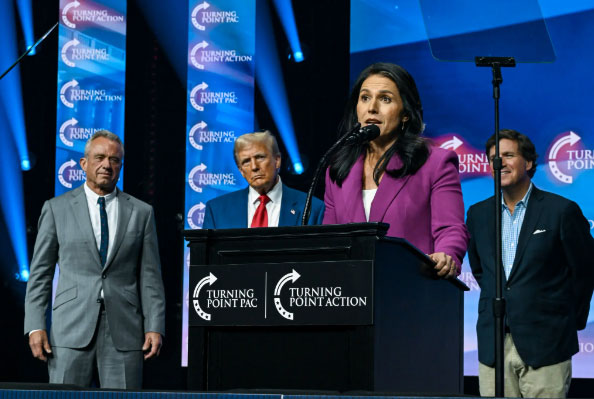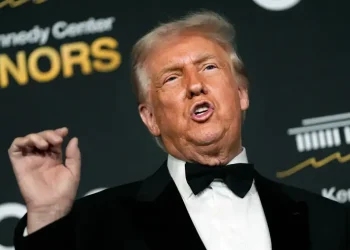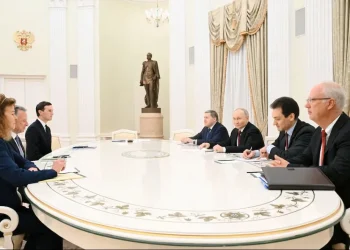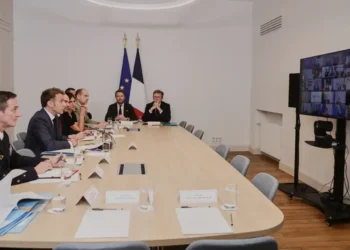Trump Selects Tulsi Gabbard as Director of National Intelligence
President-elect Donald J. Trump announced Wednesday that he has chosen Tulsi Gabbard, a former Democratic congresswoman, to serve as Director of National Intelligence. This prominent position would place Gabbard in charge of overseeing 18 U.S. intelligence agencies.
Gabbard, a lieutenant colonel in the Army Reserve with service experience in Iraq, is known for her outspoken views on U.S. foreign policy. She has long criticized mainstream policies on military intervention, positioning her as a nontraditional choice for the intelligence community. This selection signals Trump’s intent to assign key foreign policy roles to individuals who are skeptical of U.S. military engagements abroad.
In his statement, Trump praised Gabbard’s “fearless spirit” and expressed confidence that she would bring a “peace through strength” philosophy to her leadership in the intelligence sector. He also noted that she joined the Republican Party after years as a Democrat, citing his leadership as a reason for her shift. According to Trump, Gabbard was inspired by his efforts to “return the Republican Party to a party of the people and a party of peace.”
The announcement of her appointment was first disclosed by Trump’s longtime adviser Roger Stone on his X account, where he shared a statement Trump had sent him.
Responsibilities and Past Experience
In her role, Gabbard would become one of Trump’s top intelligence advisers, working closely with John Ratcliffe, Trump’s selection to lead the CIA. Her primary responsibilities will include managing the 18 intelligence agencies under her jurisdiction and preparing the President’s Daily Brief—a summary of critical intelligence updates. While Trump rarely reviewed written intelligence reports in his first term, he frequently engaged in face-to-face briefings to discuss pressing global issues.
The path to her confirmation could face scrutiny, as Democratic senators are likely to question her past meetings with controversial figures, such as President Bashar al-Assad of Syria, as well as her previous support for certain Russian-backed narratives.
Senator Mark Warner, a Democrat from Virginia and the chairman of the Senate Intelligence Committee, expressed reservations, stating, “These are extraordinarily serious jobs. That’s why the Senate has an advise and consent process. I have a lot of questions.”
Gabbard’s Political Journey
Gabbard left the Democratic Party after her unsuccessful bid for the presidential nomination in 2020, gaining popularity among Trump supporters for her outspoken positions. At one point, Trump considered her as a potential running mate, and she even played a role in helping him prepare for his debate attacks on Vice President Kamala Harris, whom she had previously criticized during the Democratic primaries.
A Samoan American and former congresswoman for Hawaii, Gabbard gained national attention during her time in office for her critiques of U.S. intervention in the Middle East and skepticism toward traditional foreign policy. Her disagreements with President Obama’s approach to Syria, particularly U.S. airstrikes on ISIS and military advising, cemented her reputation as an anti-establishment voice in foreign policy. In 2017, she controversially met with Syrian President Assad, a move that drew criticism over his human rights record.
Conflicts with Democratic Leaders and Conservative Shift
Over the years, Gabbard has often clashed with prominent Democratic figures. She accused the Democratic Party of being too aligned with the “foreign policy establishment” and the “military-industrial complex.” Her criticism extended to former Secretary of State Hillary Clinton, whom she called the “queen of the warmongers” after Clinton suggested that Russia was supporting Gabbard.
After her time in Congress, Gabbard adopted more conservative positions, ultimately announcing her departure from the Democratic Party. Following Russia’s invasion of Ukraine in 2022, she stirred controversy by posting a video echoing the unproven claim that the U.S. was funding biological weapons labs in Ukraine—a statement that prompted Senator Mitt Romney to accuse her of “parroting false Russian propaganda.”
This article was rewritten by JournosNews.com based on verified reporting from trusted sources. The content has been independently reviewed, fact-checked, and edited for accuracy, neutrality, tone, and global readability in accordance with Google News and AdSense standards.
All opinions, quotes, or statements from contributors, experts, or sourced organizations do not necessarily reflect the views of JournosNews.com. JournosNews.com maintains full editorial independence from any external funders, sponsors, or organizations.
Stay informed with JournosNews.com — your trusted source for verified global reporting and in-depth analysis. Follow us on Google News, BlueSky, and X for real-time updates.














